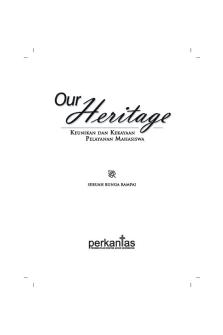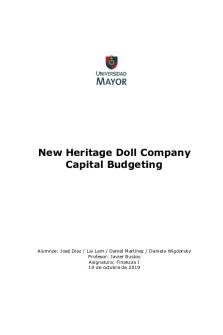The Heritage Chain PDF

| Title | The Heritage Chain |
|---|---|
| Author | Caroline Brnich |
| Course | Transcultural Health: Principles and Practice |
| Institution | West Chester University of Pennsylvania |
| Pages | 3 |
| File Size | 79.5 KB |
| File Type | |
| Total Downloads | 55 |
| Total Views | 147 |
Summary
Heritage chain notes for HEA 110 with Louise Makau-Barasa...
Description
2/5/19 The Heritage Chain I.
II.
III.
Culture A. The sum total of socially inherited characteristics of a human group that compromises everything which on generation can tell, convey, or hand down to the next B. The non-physically inherited traits we possess C. A “metacommunication system” D. Cultural characteristics 1. Culture is the medium of personhood and social relationships 2. A complex whole in which each part is related to every other 3. Learned, and must be learned by each person in a family and social community 4. Dependent on an underlying social matrix (Bohannan) E. Cultural symbols 1. Symbols of culture form the basis of all languages 2. Symbols are everywhere 3. Countless symbols are relevant to traditional Health and Illness beliefs and practices 4. Symbols of American Culture ex: a) Statue of liberty b) Flag c) McDonalds Ethnicity A. Identity with or membership in a particular racial, national, or cultural group and observance of that group’s customs, beliefs, and language B. Pertaining to membership in a social group within a cultural and social system C. A group of people that share a common and distinctive racial, national, religious, linguistic, or cultural heritage (OMH) D. Ethnic Groups 1. At least 106 ethnic groups in US 2. More than 567 American Indian Nations a) Only represent 1.3% of American population E. Common Characteristics of Share Ethnicity 1. Geographic origin 2. Language and dialect 3. Religious faith)s 4. Food pref 5. Clan origins, kinships ties 6. Traditions 7. Etc (Check ppt online when she uploads) Religion
IV.
A. The belief in a divine or superhuman power or powers to be obeyed and worshipped as the creator(s) and ruler(s) of the universe; and a system of beliefs, practices, and ethical values. B. Religions’ influences on health 1. The Jewish and Muslim faiths prohibit eating pig products 2. The Catholic faith forbids abortion a) Contraceptives 3. The Jehovah’s Witness faith forbids blood transfusions 4. The Mormon faith prohibits the use of caffeine and tobacco 5. Meditating, prayer and worship have been shown to benefit the health through physiological effects of positive emotions 6. Hoping for recovery through positive thoughts and optimism 7. Coping with stress and isolation through regular religious fellowship 8. Health promoting beliefs and personality styles 9. Mystical experiences benefit health by activating a healing bioenergy Heritage Consistency A. How much or how little a person's lifestyle reflects his or her traditional culture B. The concept of heritage consistency includes a determination of one's cultural ethnic and religious background C. Heritage consistency implies maintaining more of the core values, beliefs, attitude and behaviors of one's cultural heritage D. Heritage inconsistent means tha tone deviates from thewi cultural heritage E. Key factors related to heritage consistency 1. Socialization a) acquiring the charactics of the culture within which one is raised b) Begins from childhood - individuals acquire values, habits and attitudes c) Places of socialization (1) Formal education settings (a) Preschool, elementary school, high school, . college (2) Informal settings (a) Community gatherings, heal care provider program, etc 2. Acculturation a) The process of becoming a competent participant in the dominant culture b) Changes of one’s cultural patterns to those of the host society c) Degree and speed of acculturation is dependent on individual circumstances and choices d) Exchange of features that result when groups come into continuous firsthand contact e) Results in cultural behavioral changes e.g. dressing, foods, sociocultural event
(1) Ex. superbowl 3. Assimilation a) Event of identification with the dominant culture b) Beyond acculturation, a person chooses/obtains a new cultural identity c) This process encompasses various aspects, such as: (1) Cultural or behaviors (2) Marital (3) Identification (4) Civic engagement F. Characteristics of heritage consistency 1. Check slides online...
Similar Free PDFs

The Heritage Chain
- 3 Pages

Our Heritage
- 161 Pages

The Electron Transport Chain
- 2 Pages

New Heritage Case - Assignment
- 4 Pages

Midterm Review American Heritage
- 1 Pages

American Heritage APT readings
- 12 Pages

Heritage notes class
- 3 Pages
Popular Institutions
- Tinajero National High School - Annex
- Politeknik Caltex Riau
- Yokohama City University
- SGT University
- University of Al-Qadisiyah
- Divine Word College of Vigan
- Techniek College Rotterdam
- Universidade de Santiago
- Universiti Teknologi MARA Cawangan Johor Kampus Pasir Gudang
- Poltekkes Kemenkes Yogyakarta
- Baguio City National High School
- Colegio san marcos
- preparatoria uno
- Centro de Bachillerato Tecnológico Industrial y de Servicios No. 107
- Dalian Maritime University
- Quang Trung Secondary School
- Colegio Tecnológico en Informática
- Corporación Regional de Educación Superior
- Grupo CEDVA
- Dar Al Uloom University
- Centro de Estudios Preuniversitarios de la Universidad Nacional de Ingeniería
- 上智大学
- Aakash International School, Nuna Majara
- San Felipe Neri Catholic School
- Kang Chiao International School - New Taipei City
- Misamis Occidental National High School
- Institución Educativa Escuela Normal Juan Ladrilleros
- Kolehiyo ng Pantukan
- Batanes State College
- Instituto Continental
- Sekolah Menengah Kejuruan Kesehatan Kaltara (Tarakan)
- Colegio de La Inmaculada Concepcion - Cebu








